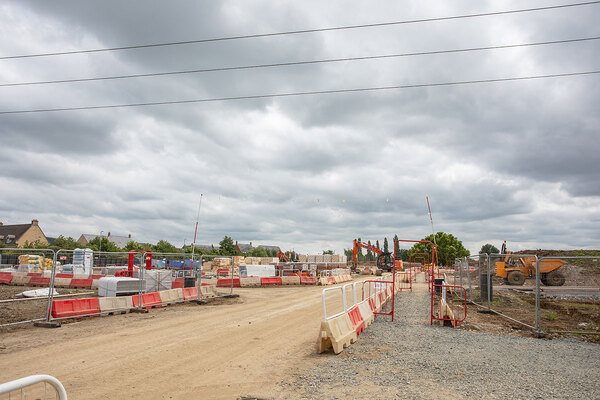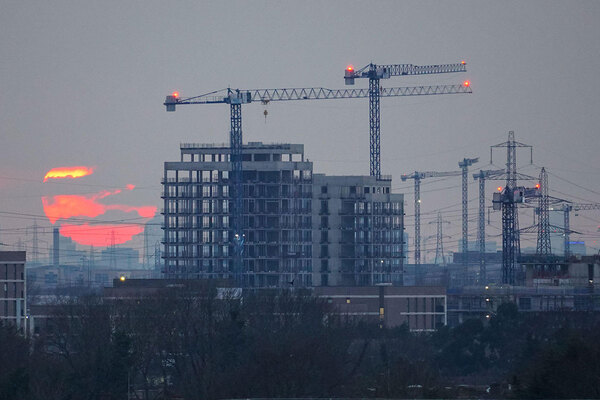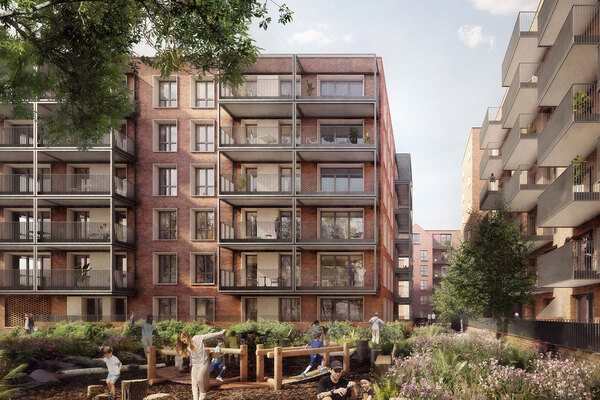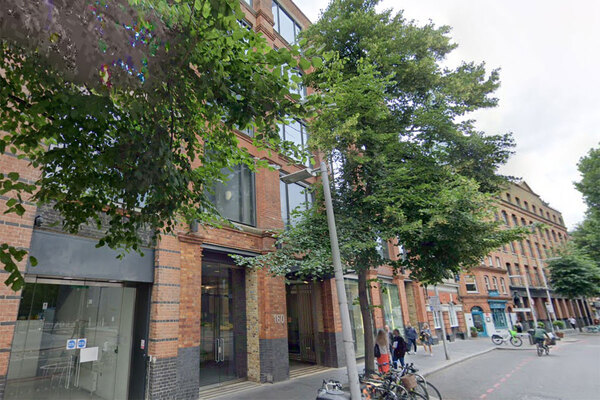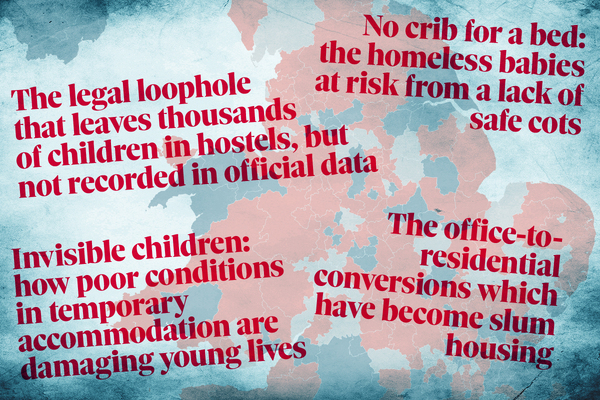Meet Inside Housing’s new development panel
Inside Housing’s new development panel aims to lend practical expertise on how to build a new generation of social rent homes. Jess McCabe reports

Inside Housing’s Build Social campaign is calling for a massive increase in social rent homes. The gap between the numbers being built at present and what the experts say is needed – roughly 100,000 a year across the UK – is huge.
For example, in England, only 9,561 social rent homes were completed in 2022-23. How do we get there? To help find the answers, Inside Housing is launching a new panel of development experts. They are drawn from housing associations and councils which have been building high numbers of social rent homes – so who better to advise on what is needed to up delivery?
This panel has the practical experience to guide the step up in development. You will hear more from them in the future, through comment pieces, roundtable discussions and more. But first, we want to introduce them and let them explain why social rent is important.
Adunni Adams, lead senior project manager, Ealing Council
“The ever-deepening housing crisis continues to manifest significantly negative consequences, particularly for the most vulnerable in society. The availability of quality social rent homes overwhelmingly influences the life chances of people in most need. The woeful lack of supply continues to exacerbate the numbers of people sleeping rough and staying in dangerously unsuitable accommodation.
“There is no doubt that more social rent homes are absolutely needed.”
Russell Baldwinson, executive director of development, LiveWest
“Against a backdrop of house-price inflation, high house prices and rent generally increasing year on year, social rented homes are the only option for many families on low incomes to access a safe, secure, good-quality home.
“We often see close to 100 applications for each social rented home we offer in popular family areas, so clearly demand is far outstripping supply in the South West, where house prices in relation to incomes is one of the great disparities nationally.”
Martyn Blackman, chief investment officer, Bromford
“Building homes for social rent is crucial to meeting the need for genuinely affordable housing for families who need a safe, secure place in which they can thrive, both now and in the future.
“Increasing the supply of social rent homes also benefits the wider community by helping to combat homelessness, reducing social inequality and boosting local and national economies.”
Nilam Buchanan, regional managing director, Places for People
“The only way we can create truly inclusive communities is by ensuring that we continue to deliver and increase the provision of social rented homes.
“It is vital that registered providers continue to focus efforts on developing homes of this tenure, as they are the only way we can ensure that the most vulnerable in our society are able to access safe, secure and truly affordable housing.
“By doing this, we can help address the growing housing crisis, promote social inclusion and help to achieve economic stability for our communities.”
Phil Jenkins, executive director – development, Peabody
“In London, one in 23 children sleep in temporary accommodation, and the waiting list for social rent homes in some areas is longer than a decade.
“It’s crucial the country builds more good-quality social housing to support people’s health and well-being, alleviate poverty and improve social mobility. Doing so would also create jobs and promote economic growth.”
Lindsay Lauder, director of development and regeneration, Wheatley Group
“We were delighted that Wheatley Group was recently named by Inside Housing as the UK’s biggest builder of social housing in the UK for the last decade – that’s testament to our commitment to provide more affordable housing.
“In light of the housing emergency announced by the Scottish government, we are proud to use our size and scale to help address the shortage of affordable housing in Scotland and address homeless targets. Currently, around 75% of all homes built as part of our new build programme is for social rent.”
Joe Marshall, regional managing director, SNG
“Why it’s important to build social rent: a good, affordable home is the foundation of a better life and we simply don’t have enough.
“Housing should be treated as national infrastructure, providing opportunities and reducing the suffering that we see every day from a lack of affordable homes.”
Peter Martin, group managing director of development, Sanctuary
“We remain committed to our development programme and to playing our part in helping to address the critical shortage of social and affordable housing nationally.
“While the housing crisis, nationally, can only be solved through everyone working together, at Sanctuary we are determined to deliver more affordable homes and to create sustainable communities where people choose to live.”
Helen Moore, group director, Orbit Homes
“Building more social rent homes is absolutely essential in helping to tackle the housing crisis in the UK and the inequitable nature of the country’s housing supply.
“According to Shelter, a record 145,800 children are currently homeless and living in temporary accommodation, which can have a detrimental effect on their life chances, from negatively impacting their mental health and education, to finding sustainable employment in adulthood. Building more social rent homes will make a life-changing difference to these children and increase their chances of a positive and secure future.
“In addition, building more energy-efficient social rent homes will also help to reduce running costs for customers, drive economic growth and meet decarbonisation targets.”
Setareh Neshati, head of development, Westminster City Council
“Building social homes is a vital component of a cohesive and successful society that is built on fairness and opportunity for all.
“This is particularly true in dense urban areas like Westminster, where individuals’ socio-economic circumstances can vary enormously. Building social homes means no group is left behind and everybody has a chance to prosper.”
Gerraint Oakley, executive director of growth and development, Platform
“Research has shown that we need to build 90,000 new social rented homes every year, but a lack of funding means that, as a nation, we are simply unable to deliver anywhere near that number.
“We want everyone to have the peace of mind that comes with having a place to call home. We are working hard to form key partnerships that will maximise the opportunity to keep building social rented homes. I would urge all the political parties to prioritise a long-term plan for housing that would enable us to more quickly form these relationships and speed up delivery.”
Hakeem Osinaike, strategic director of housing, Southwark Council
“An affordable, decent home helps to address health inequalities and increase educational attainment and employability. Council homes have played, and will continue to play, a crucial role in addressing these issues and in solving the national housing crisis.
“We therefore must urgently address the broken financial model for council housing, which is making keeping our homes high quality and safe increasingly challenging, and building the new homes our community needs impossible.”
Vicky Savage, executive group director of development and sales, L&Q
“At L&Q, we believe that everyone deserves a quality home that gives them the chance to live a better life.
“The housing crisis is at a desperate level and the building of new homes is the only solution. At the moment, London local authorities are spending £90m per month on temporary accommodation – instead, that money could be spent on building new social housing.
“This would help prevent an entire generation of children growing up in unstable, often unsuitable and insecure housing and would improve their parents’ health, well-being and economic prospects.”
Jan Sloan, executive director of development and new business, Clanmil
“Having the right place to call home is essential to living well.
“A vibrant social rented sector has an important part to play in creating safe, secure and welcoming places – places where families and individuals can flourish and thrive, and that improve people’s chances of getting ahead in life.”
Comments from people working at local authorities were provided before the beginning of the the pre-election period
Recent longform articles by Jess McCabe
Inside Housing Repairs Tracker 2024
How much did English housing providers spend on repairs and maintenance in 2022-23? Jess McCabe looks through their financial records to find out
Who has built the most social rent in the past 10 years?
Jess McCabe delves into the archives of our Biggest Builders data to find out which housing associations have built the most social rent homes
Biggest Council House Builders 2024
For the second year running, Inside Housing names the 50 councils in Britain building the most homes. But is the rug about to be pulled on council development plans? Jess McCabe reports
Inside Housing Chief Executive Salary Survey 2024
Inside Housing’s annual survey reveals the salaries and other pay of the chief executives of more than 160 of the biggest housing associations in the UK, along with the current gender pay gap at the top of the sector. Jess McCabe reports
Sign up for our development and finance newsletter
Already have an account? Click here to manage your newsletters



















